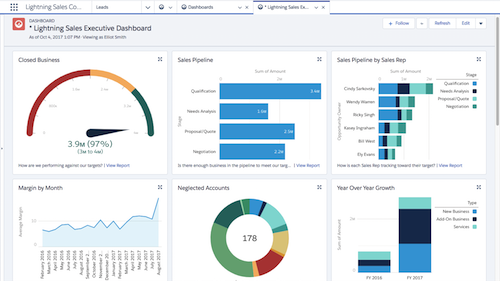
Get your FREE 30-day trial.
Please complete all fields.
If you are a business owner or a sales manager, you’ve probably heard the term “CRM.” But what does CRM do?
C-R-M stands for customer relationship management. What is CRM? At its simplest definition, a CRM system allows businesses to manage business relationships and the data and information associated with them.
With CRM, you can store customer and prospect contact information, accounts, leads, and sales opportunities in one central location, ideally in the cloud so the information is accessible by many, in real time.
Just like ubiquitous social networking platforms such as Facebook and Twitter, a CRM system is similarly built around people and relationships. And that's exactly why it can be so valuable for a fast-growing business.
Any business starts out with a foundation of great customer relationships. You, the seller, connect with people who need your product. Yet, as your company grows, these business connections grow more sophisticated. It’s not just a transaction between the buyer and seller. You start to manage a myriad of connections, across time, within each company you do business with. You need to share information across various teams within your own organization who make contact with the same customers. A CRM system can serve as a vital nerve center to manage the many connections that happen in a growing business. How do you translate the many streams of data coming in from sales, customer, service, marketing, and social media monitoring into actionable business information?
A CRM gives everyone across the business, including sales, customer service, marketing, and business development, a better way to manage the customer relationships and interactions that drive success. With visibility and easy access to customer data, such as contact information, sales opportunities, service issues, and marketing campaigns, a CRM system can give you a clear overview of your customers. With an easy-to-use, customizable dashboard, you can see a 360-degree view of the customer, all in one place.
For small businesses, a CRM system may simply help you put your data in the cloud, making it accessible in real time, across any device. But as you grow, a CRM can quickly expand to include more sophisticated features to help teams collaborate with colleagues and customers, send customized emails, gather insights from social media conversations, and get a holistic picture of your business health in real time.
Today growing businesses manage customer connections and information in a variety of ways. Some use old fashioned note cards and Rolodex. Others store information on their mobile phone while on the go. Others use Excel spreadsheets or Google documents. While that may help in the short term when you have a small team and don’t plan on scaling your business, if you want to scale for growth, it may be time to consider a CRM system to help you collect your precious business data in one place, make it accessible via the cloud, and free up your time to focus on delighting customers rather than letting valuable insights and information fall through the cracks.
Though CRM systems have traditionally been used as tools for sales and marketing departments, customer service teams see big benefits from a CRM platform as well. Today's customer has a wide variety of channels to choose from when seeking help with a customer service issue — they may start by sending a tweet, then switch to email or phone to resolve the issue in private. A CRM platform helps service teams manage customers requests coming in from all channels without missing a beat.
By moving to the cloud from on-premise software, businesses are freed from the need to install software on every single employee desktop computer and mobile device at their organization worldwide. By moving data, software, and services into a secure online cloud environment, businesses can increase productivity, reduce cost, and increase scalability. Cloud-based CRM systems mean every user is working off of the same information, all the time — it's automatically synced. Your employees can work from anywhere, including your sales team on the road that is able to instantly update information after a meeting with a prospect. Plus, there's no hardware to set up or upgrade, keeping IT costs low.
Wondering if your business can benefit from a CRM system? Check out the new step-by-step guide, starting with Chapter 1: 6 Ways CRM Helps You Grow Your Business.